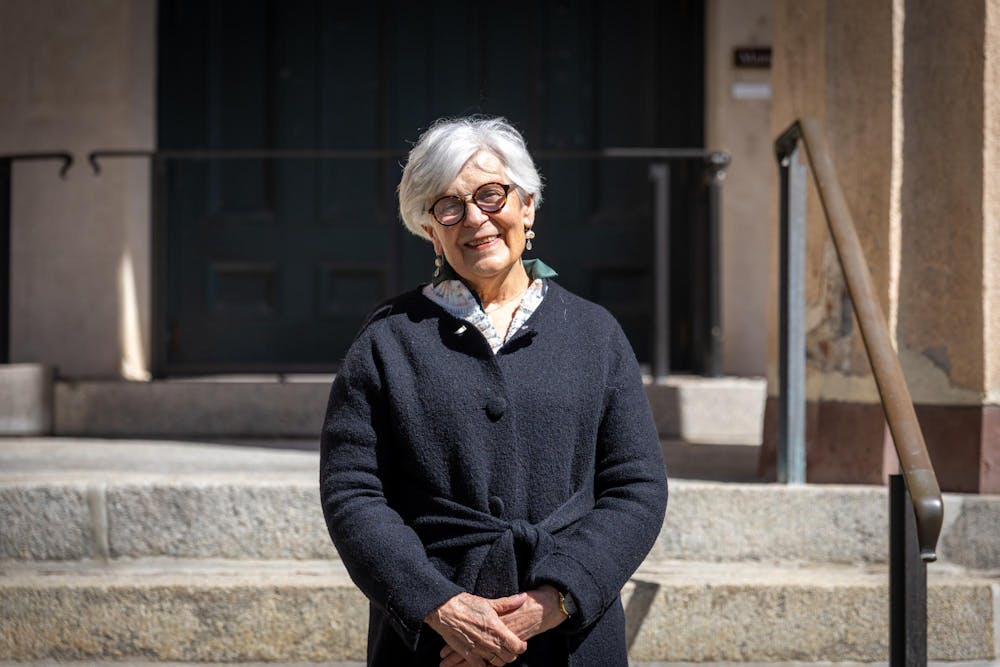As another academic year comes to a close, it seems like only yesterday that I mailed my annual letter to incoming Brunonians. Maybe you remember receiving or reading it? Now, I send a final grateful goodbye through the pages of The Herald. Though in my retirement, the situation on College Hill will no longer be my first concern, your firsthand reports of deep engagement have heartened me. So this time I send a loving paper airplane your direction to say a simple but profound thank you.
While I knew and loved this work before I knew and loved Brown, life here is swift and intricate. In our shared life — a life with both immobilizing griefs and radiant triumphs, deflating failures and surprising reconstructions, bewildering questions and startling love — I often felt dizzy, even exhausted. Slowing the pace was futile. Jumping into the currents with questions and caffeine forged unbreakable bonds.
Years beyond the degrees you will receive — in boardrooms, courtrooms and operating rooms, at demonstrations, airports or cathedrals — Brunonian voices, your voices, remain distinct and audible. Your music echoes like a familiar hymn steeped in traditions we practiced, conversations overheard and memories cherished on College Hill. Perhaps it is the fragrant ink of spring’s magnolias that etched invisible tattoos on Brunonian hearts? Whatever it is, I feel it now, and stepping away is harder than I imagined.
American higher education is under threat and engulfed in chaos. Yet our leaders’ voices are steadily rising in resistance and protection. This critical work shares a resonance with a beloved passage from the ancient text of the third Isaiah (50:4): “GOD has given me the tongue of a teacher, that I may know how to sustain the weary with a word. Morning by morning (God) wakens my ear to listen as those who are taught.”
The privilege of receiving an education is neither a commodity to own nor a prestige to flaunt. Exercised in courageous ways, education holds the miraculous capacity “to sustain the weary.” Our capacity to rescue the unjustly accused, to feed, to shelter, to heal and to pursue new knowledge proves the boundless potential of learning. But these outcomes are never quick.
Those aggrieved by our system of higher education find fault with its deliberateness and demand for efficiency and immediacy. Cheaper and quicker are asserted as moral goods — a critique that is both wrong-headed and infuriating. My lifelong immersion in education disqualifies me from being a dispassionate observer. I see clearly that the current slashing of jobs and programs is cynical and rooted in a gross misunderstanding of the patience required to teach and to learn. Impatient, politicized demolition never produces sound learning or societal change. It harms and requires costly recovery and repair. But the impact on lives is always the measure. The firm reply now rising from university leaders across the nation evokes the beloved language of Brown’s 18th-century Charter. The University’s obligation to the rising generation is to enable them to “discharge the offices of life with usefulness and reputation” — this remains a reliable metric for the truly educated in the 21st century.
Leaders of merit who step up to protect our universities and our beloved nation in this time of precarity should take comfort in the words of the 19th-century poet, Emma Lazarus. Her words, forever etched into the pedestal of the Statue of Liberty, define the ethos of our nation: “Give me your tired, your poor, Your huddled masses yearning to breathe free, The wretched refuse of your teeming shore. Send these, the homeless, tempest-tost to me, I lift my lamp beside the golden door!”
Her words boldly conveyed her empathy for Jewish refugees, fleeing antisemitic pogroms in Eastern Europe, who would sail to our shores. Her poem offered rest for their weariness and conveyed her nation’s unconditional commitment to their good.
No less is asked of us than of Lazarus. As a University family entrusted with scholars and colleagues from across the globe, shared learning requires a shared commitment to safety. Surely the capacity entrusted once to Isaiah and Lazarus is also ours. There is much to speak and to write to sustain the weary, to convey hope, to intercede and to insist on even if uncomfortable or potentially endangering. To do less is to fail our generation and the present moment.
For my part, if occasionally weary after 35 years, I send my beloved Brown family only heartfelt gratitude for your inspiring companionship and courage in these troubling times. The invitation to serve as your Chaplain was the blessing of a lifetime.
May the poetry, grit and urgency that we need be granted so that together we can meet this moment Ever True. “The Students are Watching,” wrote our late Professor Ted Sizer. So is the world, and so is the One who blessed us with the privilege of learning. The weary await.
Reverend Janet Cooper-Nelson is the Chaplain of Brown University and Director of the Office of Chaplains and Religious Life . She can be reached at janet_cooper-nelson@brown.edu. Please send responses to this op-ed to letters@browndailyherald.com and other opinions to opinions@browndailyherald.com.





